
Camille-Zoé Valcourt-Synnott
Advanced Fibres, 2018
Concordia University
Independent Research / This course provides a framework for students to develop their studio practice outside the context of assignment-driven work.
Camille-Zoé installed a series of vignettes, highlighting the activity of artistic labor in relation to industrialized and domestic forms of labor. Pictured vignettes include: handmade paper from denim, vase, flowers, plaster and ceramic-dipped rope, found stool, stiffened t-shirt.

Minji Kim
Extreme Fibres: Duration and Durability, 2017
Concordia University
Beyond Clock Time / Create a piece that engages your relationship with a durational object, process or material other than clock time.
Inspired by what she imagined a penguin at the zoo’s experience of time to be, Minji constructed a suit entirely of ice cube bags, wearing it in “captivity” until it had completely melted.

Kassandra Walters
Extreme Fibres: Time-Based Textiles, 2019
Concordia University
Independent Research / This project was in response to an open-ended prompt.
Kassandra froze milk, eggs, and bread (‘essential’ foods that quickly sold out whenever a storm was forecast) in the shape of food cans, and allowed them to melt and spoil. She was interested in the placebo effect of comfort rituals in the face of trauma.

Annie Tóng Zhòu Lafrance
Extreme Fibres: Time-Based Textiles, 2019
Concordia University
Catastrophe / Negotiate the space between form & formlessness, considering how your work can address catastrophe through subversion or disruption.
Annie filmed herself performing a game of her own design. Blindfolded, and moving within a designated circular area, she transported an egg in her mouth to the top of a traffic cone without breaking the shell.

Lindsey Lagemaat
Issues in Material Practices: Encoded Beads, 2018
Concordia University
Relational Bead / Consider the bead’s parallels in architecture, the body, landscape and language, etc.
Lindsey’s sculpture approximates a stretched earlobe, asserting “low” materials such as brick, latex, bungee cords, aluminum foil and rebar in place of traditional jewelry adornments.
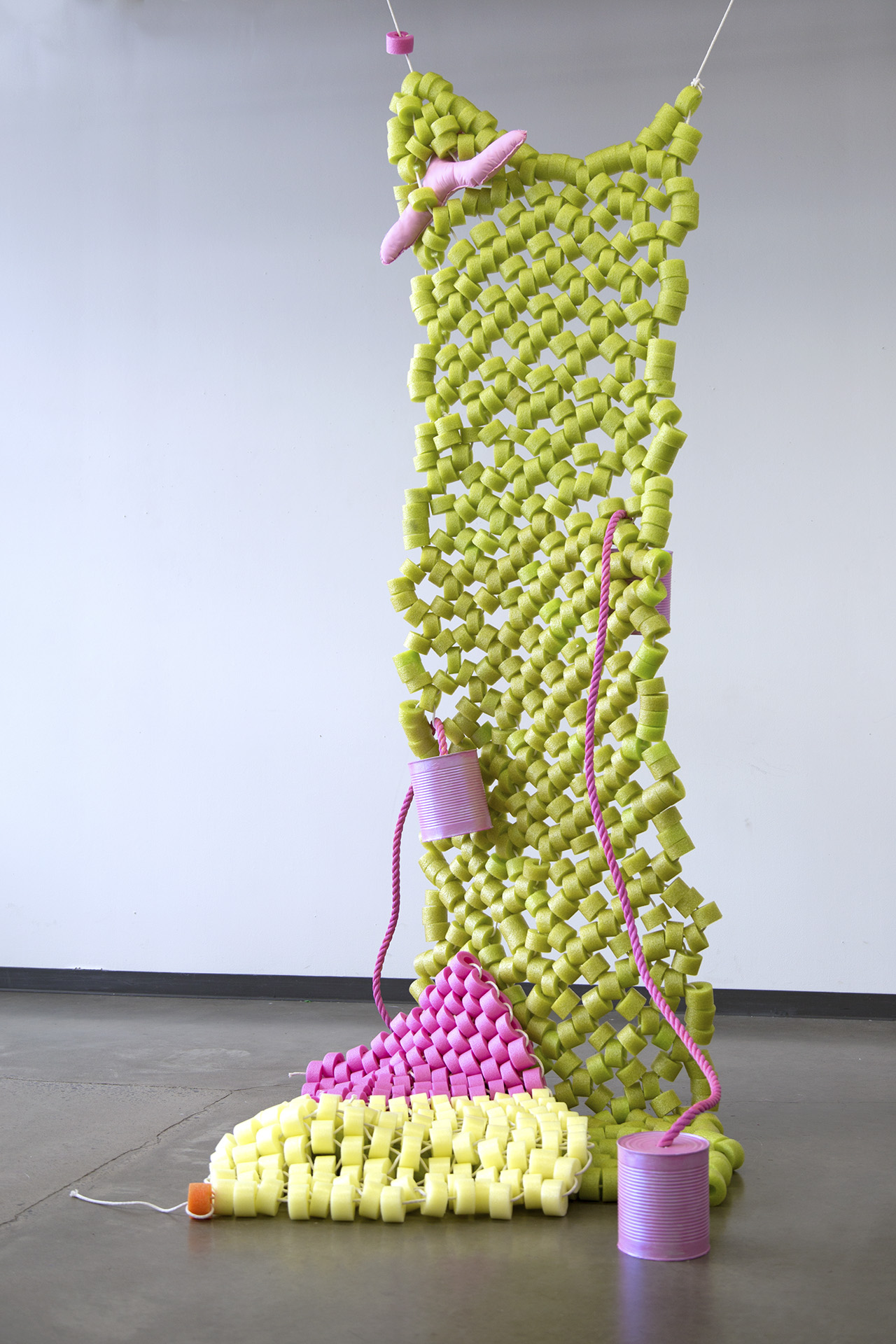
Olivia Vidmar
Issues in Material Practices: Encoded Beads, 2018
Concordia University
Relational Bead / Consider the bead’s parallels in architecture, the body, landscape and language, etc.
Olivia used a variety of media reminiscent of childhood games she had played, creating an installation tableau of these objects.
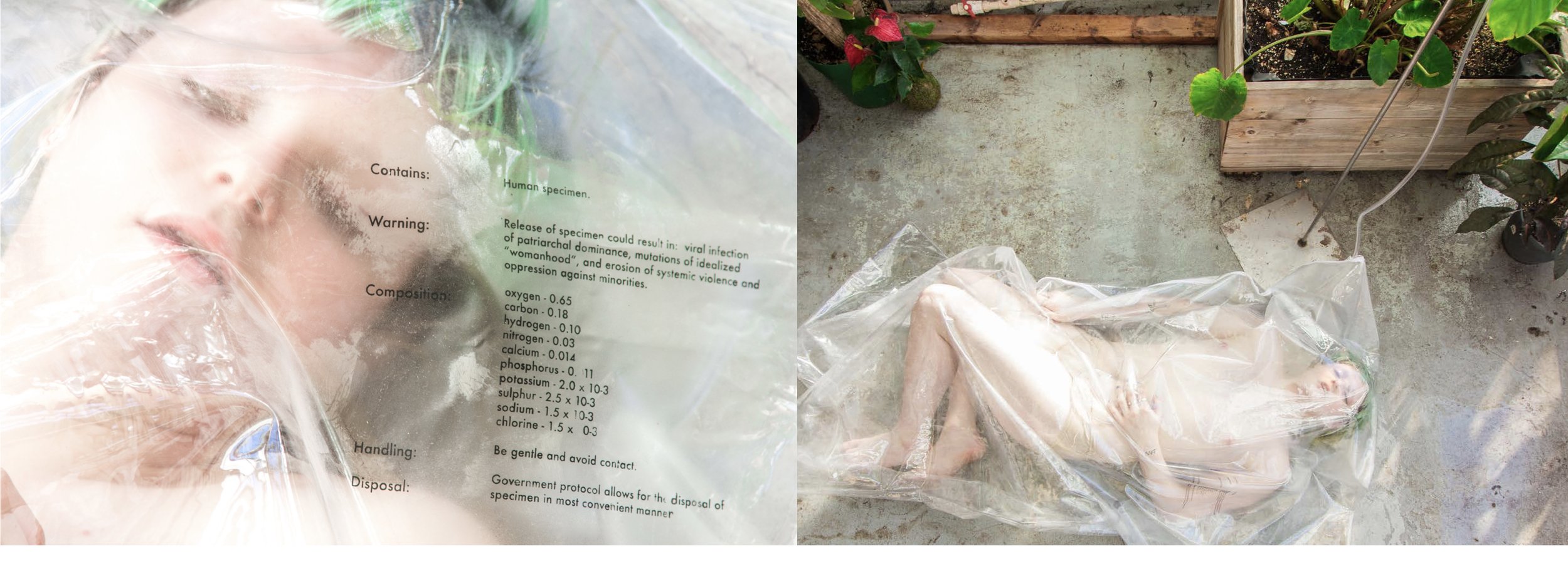
Jacqui Beaumont
Textile Printing and Dyeing I, 2018
Concordia University
Resist / Create a project that conducts an individual or collective act of resistance.
Jacqui addressed her experience as a trans woman, and the medical interventions that are a part of her transitioning. In the work, she highlights these interventions as things that are often perceived as a synthetic barrier to “natural” womanhood. Her presence in the greenhouse provides a layer of complexity that underlines her experience not as synthetic, but as gestation and growth.
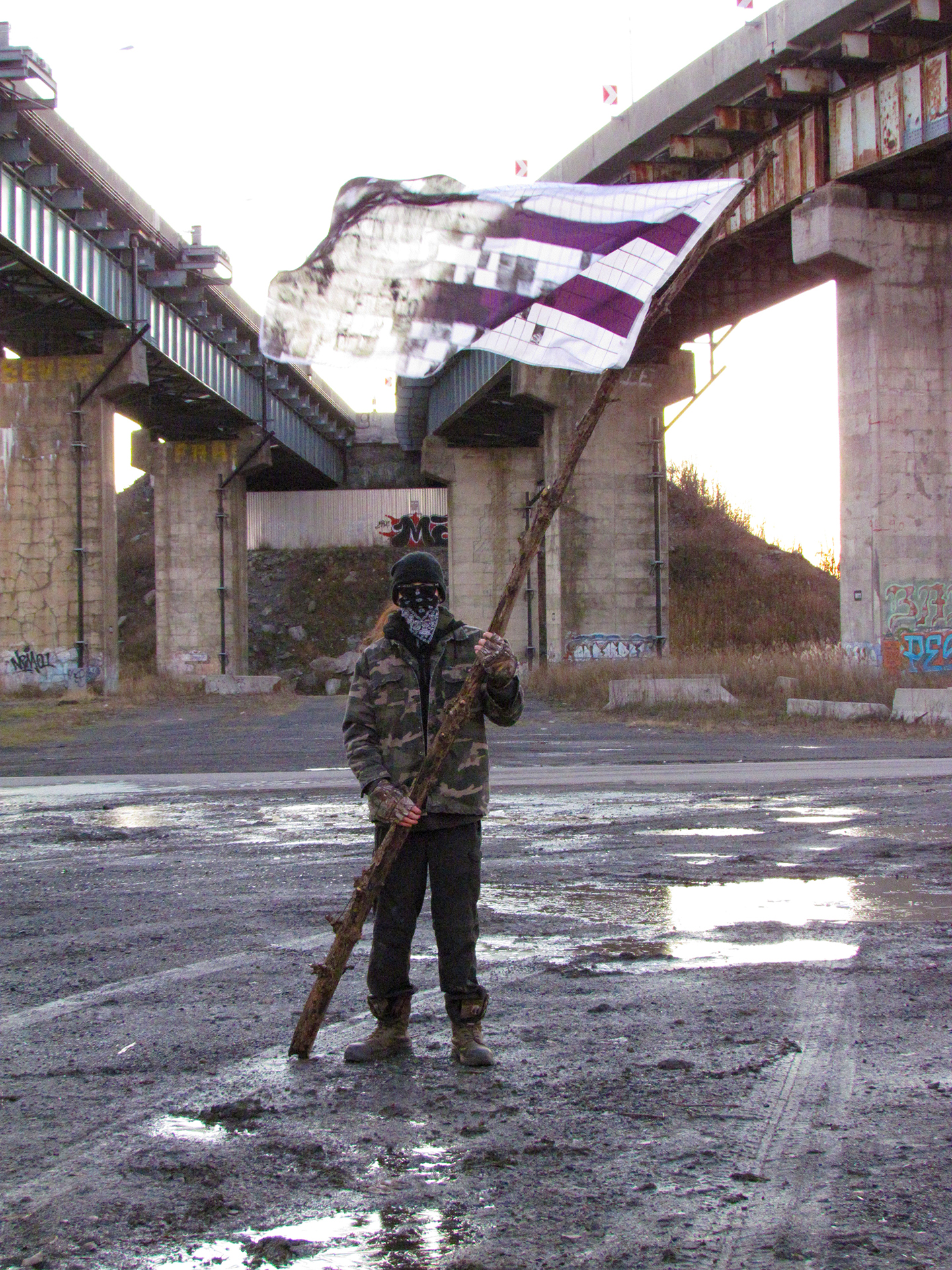
Skarahkotà:ne Deom
Textile Printing and Dyeing I, 2017
Concordia University
Flag Manifesto / Write a manifesto to guide this project. Create a site-specific “flag” based on these principles.
Skarahkotà:ne printed a pattern of beads on a found flag of the Two-Row Wampum Treaty, a 1613 beaded coexistence agreement between the indigenous Haudenosaunee and Dutch settlers. She then staged a protest at the Mercier Bridge, which connects Montréal to the Mohawk territory of Kahnawà:ke—protesting Québec’s failure to recognize the Two-Row treaty, and her Nation’s resulting loss of land. Her manifesto reads: Ténkta’ne’ tánon tsi niionkwarihò:ten ensekheiehiahráhkwen’ (I will stand and I will remind them of our ways).

Kara Beckner
Fabric Design I, 2014
Virginia Commonwealth University
Flag Manifesto / Write a manifesto to guide this project. Create a site-specific “flag” based on these principles.
Kara's manifesto and resulting performance bound her identity to the landscape of her childhood home.
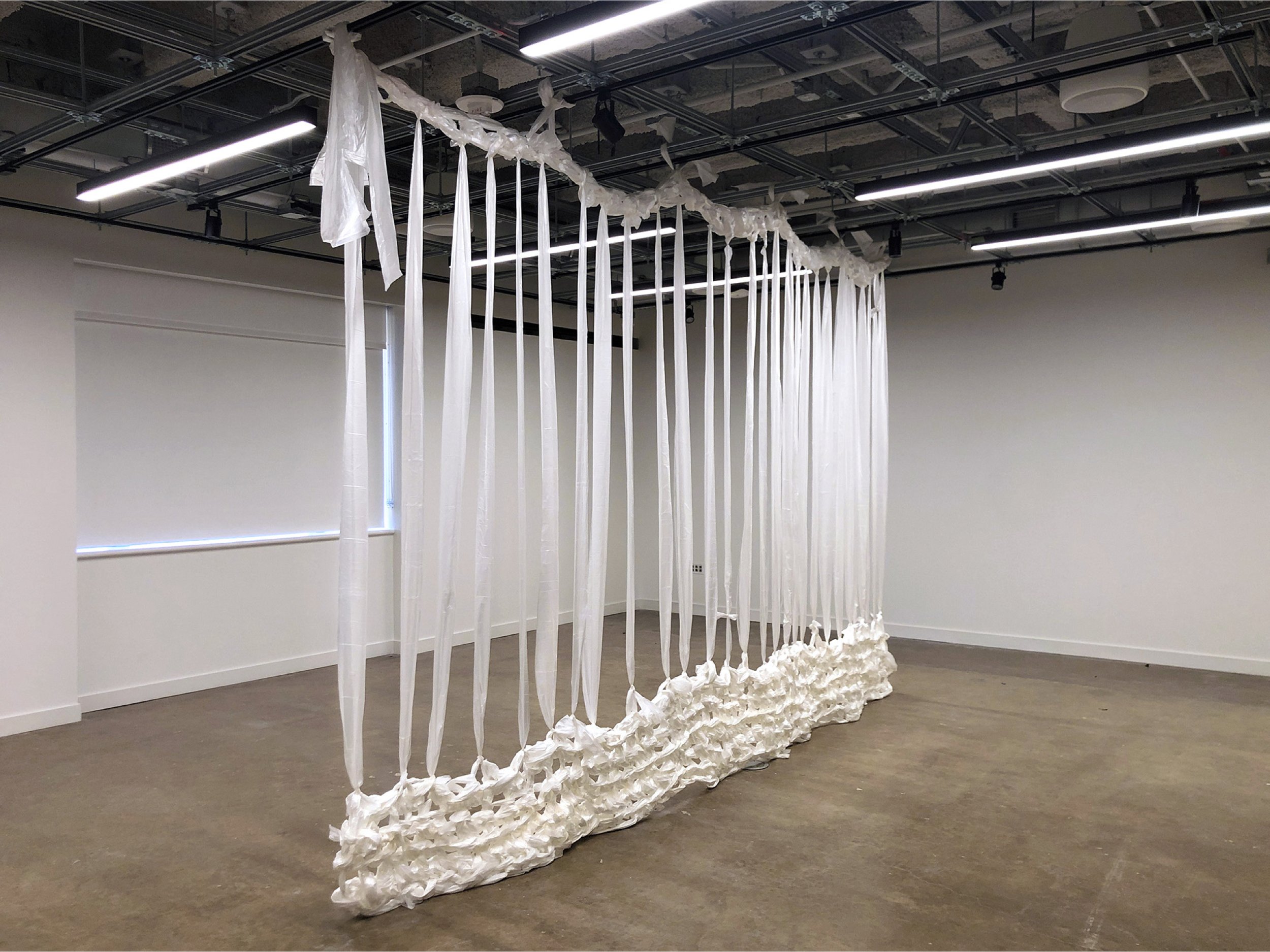
Jace Savala
Observation, 2021
Southern Methodist University
Material Explorations / Explore a specific aspect of your identity through material.
Jace used trash bags to crochet this permeable, impotent version of the U.S./Mexico border wall, commenting on the ways the U.S.’s restrictive immigration policies had affected his family.

Kai Miller
X-Sculpture, 2021
Southern Methodist University
Body as Site / Consider the body—an alternative to an architectural space, immersive landscape, or digital environment—as the location for your piece.
Kai created a net from elastic cording, and performed a repetitive breathing exercise underneath it. He was interested in inverting depictions of gravity’s influence on spacetime, as an exploration of his trans identity.

Flora Hammond
Fibre Structures I, 2018
Concordia University
Body as Site / Consider the body—an alternative to an architectural space, immersive landscape, or digital environment—as the location for your piece.
Flora used coiling and netting techniques to create a pair of shoes, on which they grew borax crystals. Their performance in Montréal’s metro system constructed an ambiguous contemporary mythology exploring their personal space and identity in crowded public areas.

Tiana Atherton
Fibre Structures I, 2018
Concordia University
Encrypted Cloth / “Encode” two discrete data sets into your project, considering the relationship between them.
Tiana made this mobile “backpack” of all the objects she uses on a daily basis, things that yield both comfort and stress. Each pocket is embroidered with a time, indicating when she took an anti-anxiety medication.
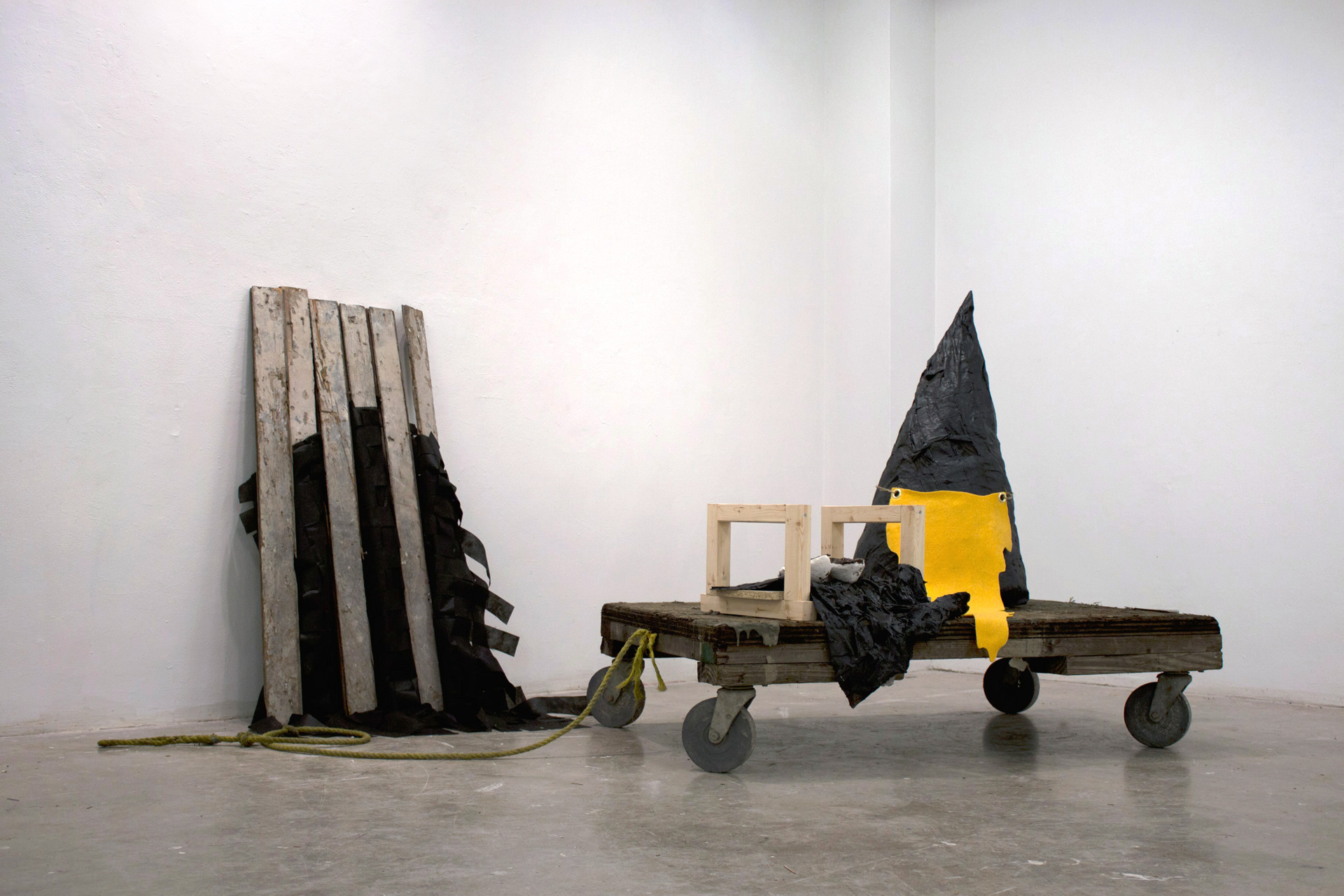
Miranda Wagner
Introduction to Textiles, 2015
Virginia Commonwealth University
Hybridity / Use disparate materials, processes or concepts to create a composite, hybrid whole.
Miranda created a tableau combining elements of landscaping (lawn ornaments, landscaping fabric, trolleys, gardening tools) with textile processes such as weaving and felting.

Capri Woss
Observation, 2021
Southern Methodist University
On Seeing / Create a collage of one object drawn from memory, and one object drawn from observation. Render this collaged image in cardboard.
Capri utilized her drawings of an ashtray and extracted teeth to create this large-scale sculpture exploring the abject and uncanny.

Magalie Desmarais-Michaud
Fibre Structures I, 2017
Concordia University
Encrypted Cloth / “Encode” two discrete data sets into your project, considering the relationship between them.
Magalie’s piece combines all of plastic waste she produced during the course of the project, and daily records of how many trees she planted during her summer job in British Columbia.
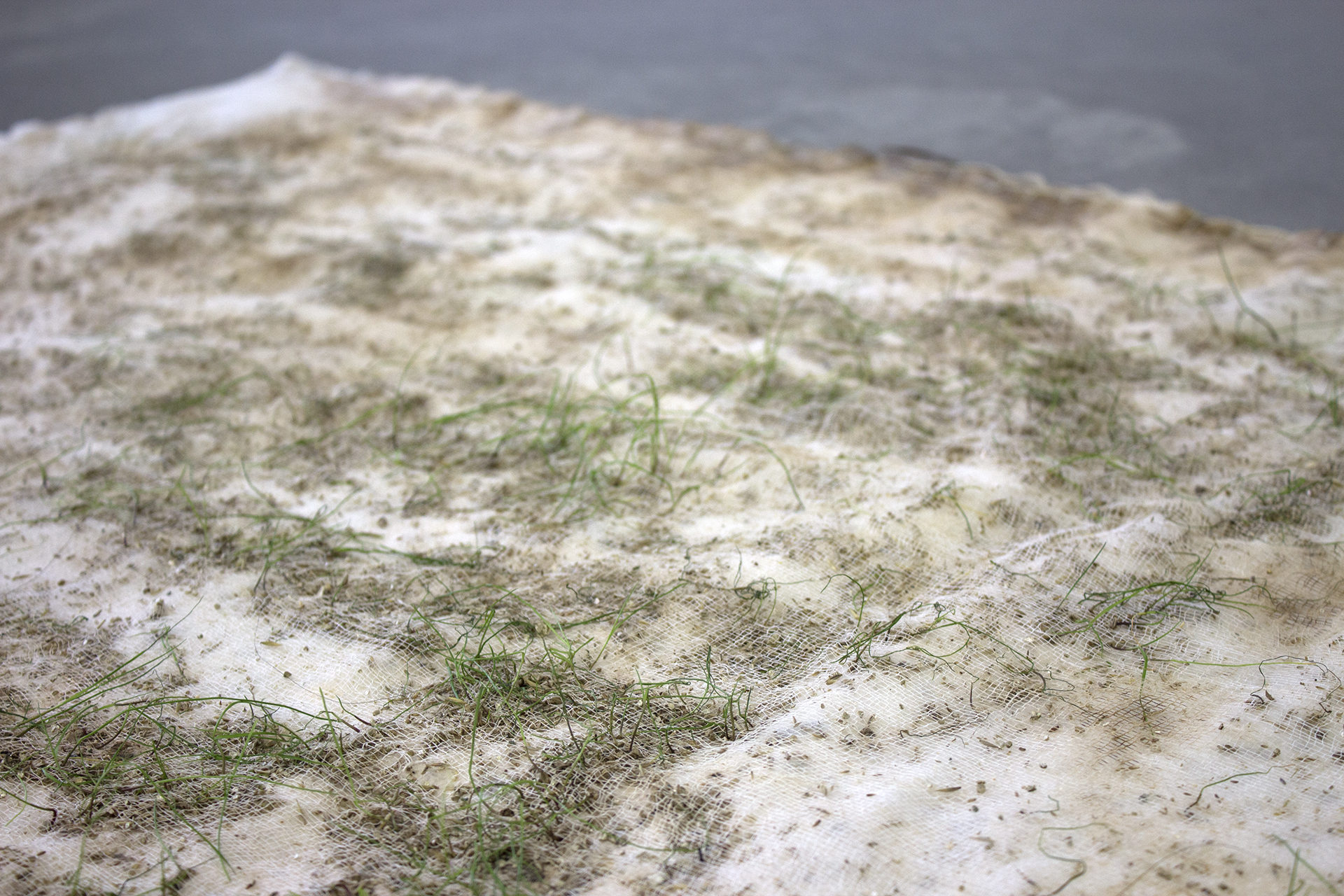
Michaela Silverman
Fibre Structures I, 2017
Concordia University
Body as Site / Consider the body as an alternative to an architectural space, immersive landscape, or digital environment as the location for your piece.
Over the course of three weeks, Michaela performed grief yoga on a handmade yoga mat lined with plant seeds. The moisture from her sweat and tears resulted in the sprouting of these seeds. The sprouted mat was accompanied by a sound recording of her breathing and yoga movements.
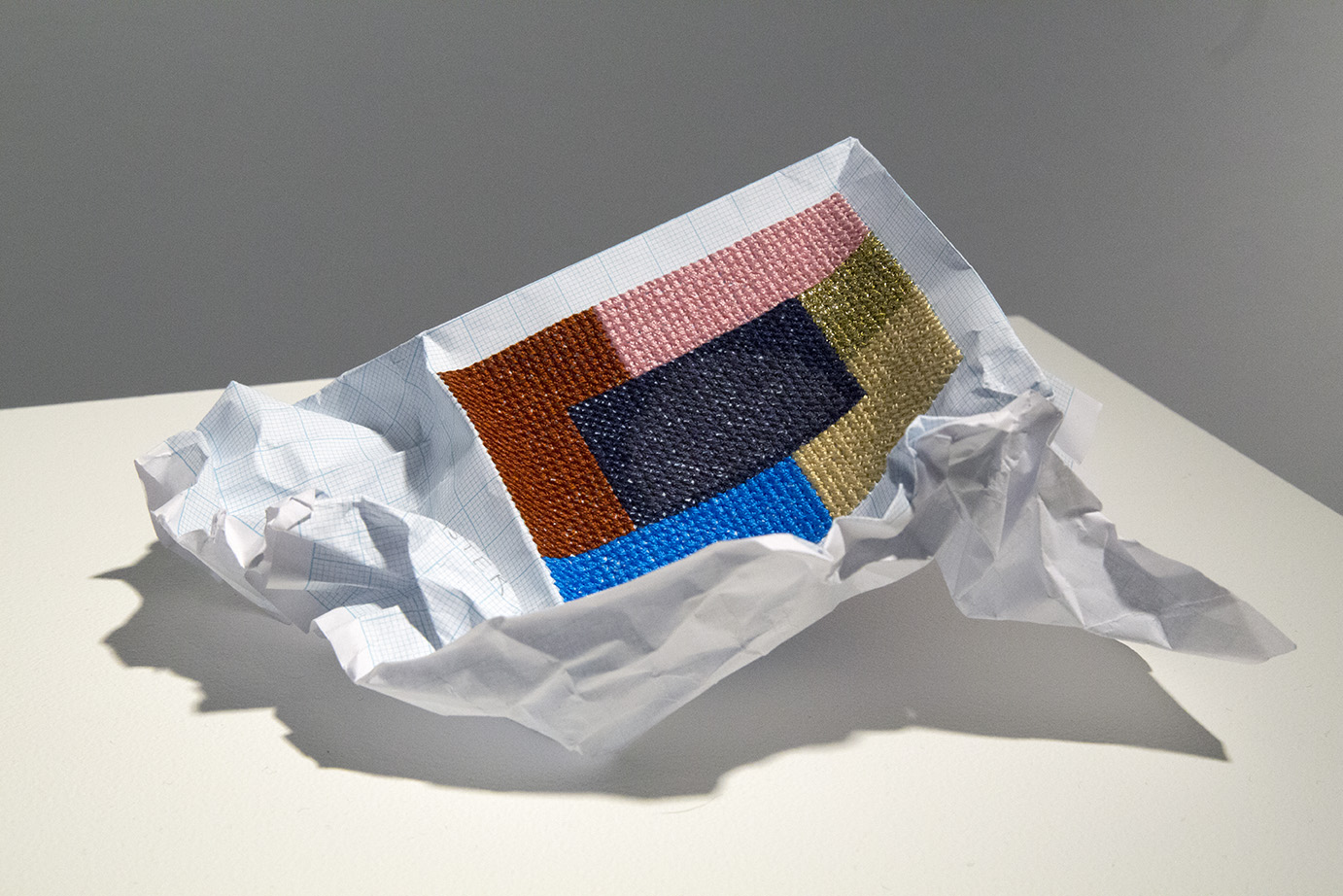
Gisèle Suzor-Morin
Advanced Fibres, 2018
Concordia University
Independent Research / This course provides a framework for students to develop their studio practice outside of the context of assignment-driven work.
Gisèle created a series of geometric embroideries on graph paper, each drawing on a specific personal experience dealing with trauma.
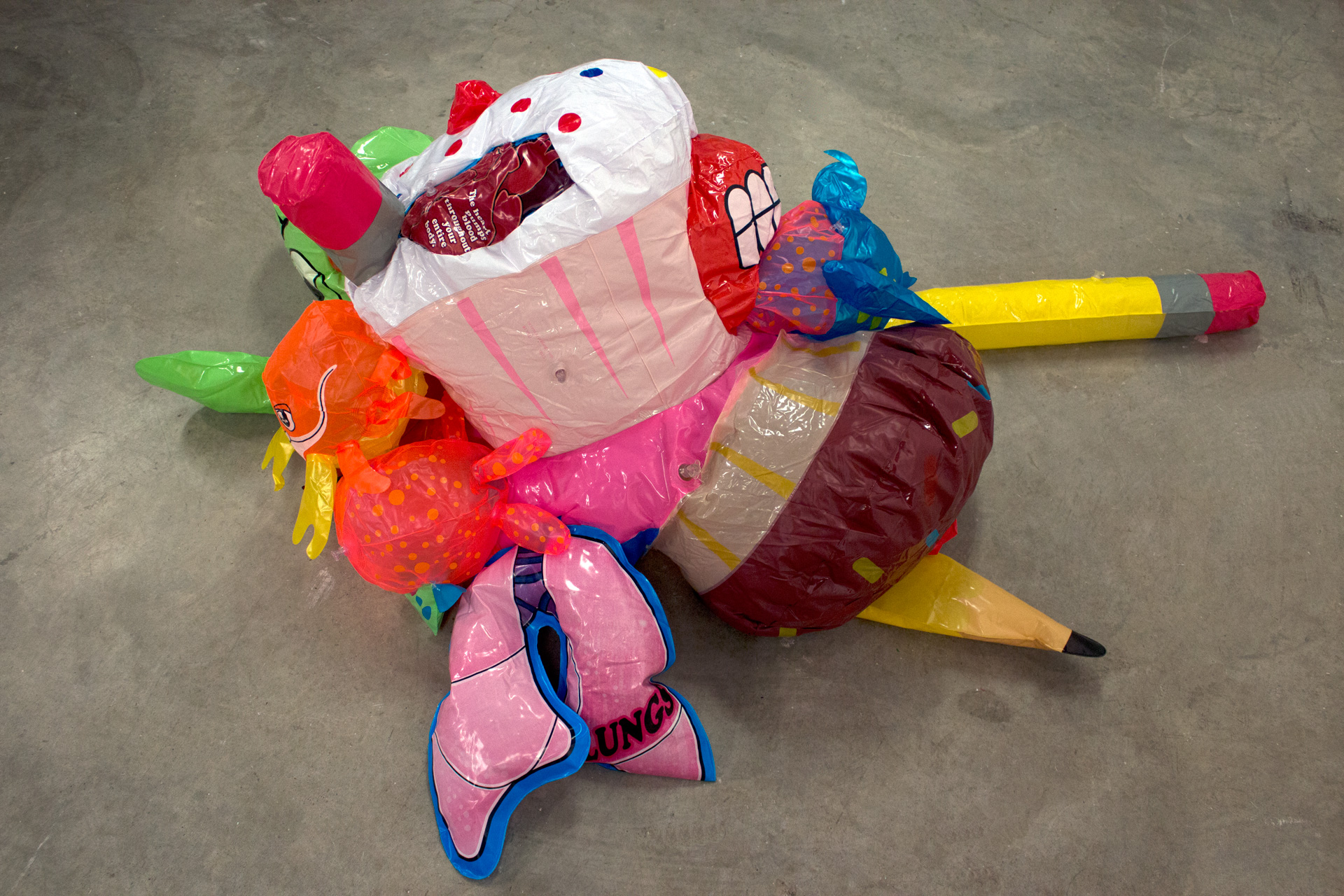
Abby Ketcham
Fabric Design I, 2015
Virginia Commonwealth University
Inflatables / Create an inflatable object that draws from one of the particular histories of inflatables including sex objects, children’s toys, wartime vehicles, architecture, fashion etc.
Abby altered found children’s inflatable toys to create a grotesque composite “creature.”

Sarah Schleer
Introduction to Textiles, 2014
Virginia Commonwealth University
Hybridity / Use disparate materials, processes or concepts to create a unified, hybrid whole.
Sarah used rust removed from a found metal sheet to dye embroidery floss, which she then stitched back into the metal form.




















Camille-Zoé Valcourt-Synnott
Advanced Fibres, 2018
Concordia University
Independent Research / This course provides a framework for students to develop their studio practice outside the context of assignment-driven work.
Camille-Zoé installed a series of vignettes, highlighting the activity of artistic labor in relation to industrialized and domestic forms of labor. Pictured vignettes include: handmade paper from denim, vase, flowers, plaster and ceramic-dipped rope, found stool, stiffened t-shirt.
Minji Kim
Extreme Fibres: Duration and Durability, 2017
Concordia University
Beyond Clock Time / Create a piece that engages your relationship with a durational object, process or material other than clock time.
Inspired by what she imagined a penguin at the zoo’s experience of time to be, Minji constructed a suit entirely of ice cube bags, wearing it in “captivity” until it had completely melted.
Kassandra Walters
Extreme Fibres: Time-Based Textiles, 2019
Concordia University
Independent Research / This project was in response to an open-ended prompt.
Kassandra froze milk, eggs, and bread (‘essential’ foods that quickly sold out whenever a storm was forecast) in the shape of food cans, and allowed them to melt and spoil. She was interested in the placebo effect of comfort rituals in the face of trauma.
Annie Tóng Zhòu Lafrance
Extreme Fibres: Time-Based Textiles, 2019
Concordia University
Catastrophe / Negotiate the space between form & formlessness, considering how your work can address catastrophe through subversion or disruption.
Annie filmed herself performing a game of her own design. Blindfolded, and moving within a designated circular area, she transported an egg in her mouth to the top of a traffic cone without breaking the shell.
Lindsey Lagemaat
Issues in Material Practices: Encoded Beads, 2018
Concordia University
Relational Bead / Consider the bead’s parallels in architecture, the body, landscape and language, etc.
Lindsey’s sculpture approximates a stretched earlobe, asserting “low” materials such as brick, latex, bungee cords, aluminum foil and rebar in place of traditional jewelry adornments.
Olivia Vidmar
Issues in Material Practices: Encoded Beads, 2018
Concordia University
Relational Bead / Consider the bead’s parallels in architecture, the body, landscape and language, etc.
Olivia used a variety of media reminiscent of childhood games she had played, creating an installation tableau of these objects.
Jacqui Beaumont
Textile Printing and Dyeing I, 2018
Concordia University
Resist / Create a project that conducts an individual or collective act of resistance.
Jacqui addressed her experience as a trans woman, and the medical interventions that are a part of her transitioning. In the work, she highlights these interventions as things that are often perceived as a synthetic barrier to “natural” womanhood. Her presence in the greenhouse provides a layer of complexity that underlines her experience not as synthetic, but as gestation and growth.
Skarahkotà:ne Deom
Textile Printing and Dyeing I, 2017
Concordia University
Flag Manifesto / Write a manifesto to guide this project. Create a site-specific “flag” based on these principles.
Skarahkotà:ne printed a pattern of beads on a found flag of the Two-Row Wampum Treaty, a 1613 beaded coexistence agreement between the indigenous Haudenosaunee and Dutch settlers. She then staged a protest at the Mercier Bridge, which connects Montréal to the Mohawk territory of Kahnawà:ke—protesting Québec’s failure to recognize the Two-Row treaty, and her Nation’s resulting loss of land. Her manifesto reads: Ténkta’ne’ tánon tsi niionkwarihò:ten ensekheiehiahráhkwen’ (I will stand and I will remind them of our ways).
Kara Beckner
Fabric Design I, 2014
Virginia Commonwealth University
Flag Manifesto / Write a manifesto to guide this project. Create a site-specific “flag” based on these principles.
Kara's manifesto and resulting performance bound her identity to the landscape of her childhood home.
Jace Savala
Observation, 2021
Southern Methodist University
Material Explorations / Explore a specific aspect of your identity through material.
Jace used trash bags to crochet this permeable, impotent version of the U.S./Mexico border wall, commenting on the ways the U.S.’s restrictive immigration policies had affected his family.
Kai Miller
X-Sculpture, 2021
Southern Methodist University
Body as Site / Consider the body—an alternative to an architectural space, immersive landscape, or digital environment—as the location for your piece.
Kai created a net from elastic cording, and performed a repetitive breathing exercise underneath it. He was interested in inverting depictions of gravity’s influence on spacetime, as an exploration of his trans identity.
Flora Hammond
Fibre Structures I, 2018
Concordia University
Body as Site / Consider the body—an alternative to an architectural space, immersive landscape, or digital environment—as the location for your piece.
Flora used coiling and netting techniques to create a pair of shoes, on which they grew borax crystals. Their performance in Montréal’s metro system constructed an ambiguous contemporary mythology exploring their personal space and identity in crowded public areas.
Tiana Atherton
Fibre Structures I, 2018
Concordia University
Encrypted Cloth / “Encode” two discrete data sets into your project, considering the relationship between them.
Tiana made this mobile “backpack” of all the objects she uses on a daily basis, things that yield both comfort and stress. Each pocket is embroidered with a time, indicating when she took an anti-anxiety medication.
Miranda Wagner
Introduction to Textiles, 2015
Virginia Commonwealth University
Hybridity / Use disparate materials, processes or concepts to create a composite, hybrid whole.
Miranda created a tableau combining elements of landscaping (lawn ornaments, landscaping fabric, trolleys, gardening tools) with textile processes such as weaving and felting.
Capri Woss
Observation, 2021
Southern Methodist University
On Seeing / Create a collage of one object drawn from memory, and one object drawn from observation. Render this collaged image in cardboard.
Capri utilized her drawings of an ashtray and extracted teeth to create this large-scale sculpture exploring the abject and uncanny.
Magalie Desmarais-Michaud
Fibre Structures I, 2017
Concordia University
Encrypted Cloth / “Encode” two discrete data sets into your project, considering the relationship between them.
Magalie’s piece combines all of plastic waste she produced during the course of the project, and daily records of how many trees she planted during her summer job in British Columbia.
Michaela Silverman
Fibre Structures I, 2017
Concordia University
Body as Site / Consider the body as an alternative to an architectural space, immersive landscape, or digital environment as the location for your piece.
Over the course of three weeks, Michaela performed grief yoga on a handmade yoga mat lined with plant seeds. The moisture from her sweat and tears resulted in the sprouting of these seeds. The sprouted mat was accompanied by a sound recording of her breathing and yoga movements.
Gisèle Suzor-Morin
Advanced Fibres, 2018
Concordia University
Independent Research / This course provides a framework for students to develop their studio practice outside of the context of assignment-driven work.
Gisèle created a series of geometric embroideries on graph paper, each drawing on a specific personal experience dealing with trauma.
Abby Ketcham
Fabric Design I, 2015
Virginia Commonwealth University
Inflatables / Create an inflatable object that draws from one of the particular histories of inflatables including sex objects, children’s toys, wartime vehicles, architecture, fashion etc.
Abby altered found children’s inflatable toys to create a grotesque composite “creature.”
Sarah Schleer
Introduction to Textiles, 2014
Virginia Commonwealth University
Hybridity / Use disparate materials, processes or concepts to create a unified, hybrid whole.
Sarah used rust removed from a found metal sheet to dye embroidery floss, which she then stitched back into the metal form.